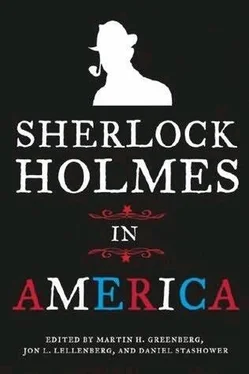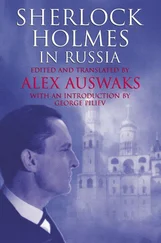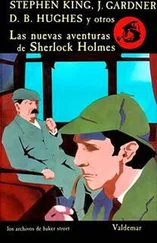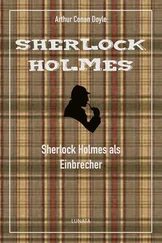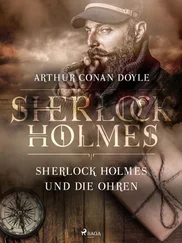“You told Mrs. Legrange that she must hit harder to make it look convincing, and the second time she managed it. A blow with a heavy brass poker is no laughing matter, even from a lady.”
“So she told you.” Lee blurted it out, a flush on his pale cheeks. Holmes did not contradict him.
“Does my father know?” Lee said.
“Not yet, but he must learn of it,” Holmes said. “It would come better from you than from me. Shall I send him in?”
Lee nodded, eyes downcast. We went out to the hall where Barratt was waiting anxiously, and Holmes said his son had something to tell him.
When the parlor door had closed on him, I turned to Holmes.
“How in the world did you know it was a poker?”
He smiled.
“You may have observed that I kissed the lady’s hand. I could see from your face that you thought I’d fallen victim to her charms. In fact, I wanted to smell her glove. I’d already observed ash on one of Lee’s boots…”
“And then you smelled it on her glove. Admirable.”
“No, I confess I expected to smell it. I should have known better. She’d leave such work to her male accomplice. The smell I caught was of something quite different: metal polish. Now, a lady of her standing would hardly polish her own household utensils; therefore she’d recently handled some metal object. In view of the young man’s injuries, a poker seemed a near certainty, confirmed by his reaction.”
“But why, Holmes?”
“Surely you can see. She knew I wasn’t taken in for a minute by that romantic tale about the fiddle. Rather than have it lose the contest, she decided to destroy it-with the help of a besotted young man.”
After a while, the parlor door opened. Barratt came out, sternfaced and led us through to the drawing room.
“Gentlemen, I must apologise to you for my son’s deception.”
“I believe it was Mrs. Legrange’s deception,” Holmes said.
“Lee would not stoop to putting the blame on a lady.”
“Even a lady who deserved it?”
“I’m sure you cannot find it in your heart to blame her. She had believed in the authenticity of that violin.”
“Just as you believe in yours?”
Holmes glanced at the instrument enshrined over the mantelpiece.
“That’s one good thing to come out of it at any rate,” I said, trying to lighten the atmosphere. “Mr. Barratt’s violin is now the only one in the field.”
Holmes and Barratt stared at each other. Barratt was the first to drop his gaze. Holmes settled himself in an armchair.
“Before we came here, Watson suggested that I should read the history of the Alamo.” His tone was conversational. “As he knows, I dislike burdening my mind with useless detail. Nonetheless, there was one aspect that interested me. The person out of step is always more interesting than the ones in step, don’t you find?”
I could not see where this was leading, but Barratt evidently did.
“Rose?”
“Yes, Louis Rose. The coward of the Alamo. The man who supposedly brought your father Colonel Crockett’s violin.”
“Supposedly? You doubt my father’s word, sir?”
“I do not doubt that your father acquired that violin under circumstances exactly as you described. Equally, I don’t doubt that he believed the vagabond at his back door to be Louis Rose. But he wasn’t.”
I expected an outburst from Barratt but he said nothing.
“I’ve done a little reading about Rose,” Holmes went on. “One detail interested me. The man was illiterate. He couldn’t read or write. You’re an intelligent man. You must have done your own research. I think you knew that he couldn’t have written that statement.”
Silence from Barratt.
“But why should any man impersonate a notorious coward?” I said.
“Because whoever the man was, he needed money and had a violin he could sell,” Holmes said. “He must have been sharp enough to realise that a hero’s violin from the Alamo would be worth much more than any old fiddle.”
Holmes took his pipe from his pocket and asked Barratt’s permission to smoke. It was given with an abstracted nod.
“I played a trick on Watson when we were walking home from your house the other night,” Holmes said. “I asked him which pocket I’d put my pipe in. He gave the matter his close attention, ignoring the obvious fact-that I hadn’t brought my pipe at all.”
“Really, Holmes, I… ”
He ignored me, and went on speaking to Barratt.
“You take my point, I’m sure. The question you posed to me from the start was which one of two, hoping that little puzzle would distract me from other possibilities. As it happened, it was of small importance to you which I chose. The thing that mattered above all was that the violin which eventually went on display at the Alamo should be certified as genuine by none other than Sherlock Holmes. Who would question that? I believe you expected me to pick up that point about Rose and to be so pleased with myself that I would give the verdict in favour of Mrs. Legrange’s instrument. Unfortunately, you neglected to inform Mrs. Legrange of your plan. Rather than have her violin slighted, she destroyed it-proving in the process that she’d never in her heart believed the family legend about it, or she couldn’t have brought herself to do it.”
“So neither of you believed in your violins?” I said to Barratt in astonishment. He raised his eyes and gave me a long look.
“There are things you believe with your head and things you believe with your heart. My heart said that violin should have survived.”
Holmes puffed at his pipe.
“You remember Señor Alvarez wished to see me?” he said.
Barratt nodded, his thoughts clearly elsewhere. Holmes slid a rough-looking piece of paper from his pocket.
“Do you read Spanish, Mr. Barratt?”
Barratt shook his head.
“It seemed more likely to me that if Crockett’s violin had survived at all, it would be in Mexican hands,” Holmes said. “You know the saying-‘to the victor, the spoils of war.’”
Barratt snapped out of his abstraction and stared at Holmes.
“You mean, the man Alvarez and his violin? Has he proof?”
Holmes said nothing, only smoothed out the piece of paper. I could see the struggle in Barratt’s face.
“Crockett’s violin, in a Mexican’s possession?”
Still Holmes said nothing. Barratt paced the room, backwards and forwards.
“I put it in your hands,” he said at last. “If you think the man’s claim is authentic, then negotiate for us. I authorise you to go up to five hundred dollars if necessary.”
“Thank you.”
Holmes rose and thumbed out his pipe.
“You’ll go tonight?” Barratt said.
“Certainly, if you wish. Come, Watson.”
From my earlier wanderings, I knew my way to the stockyards area. The house of Señor Alvarez was a white painted cube of a dwelling, sandwiched between an ironmonger’s shop and a baker’s shop with a galaxy of brightly sugared pastries in its lamp-lit window. The house door was wide open, cheerful voices speaking Spanish coming from inside. When Holmes called, Juan Alvarez came out to meet us, like a prince welcoming an equal. We were led to seats by an open fireplace where something savoury was cooking in a pot, and introduced to his wife, children, and grandmother. After some minutes of this, Holmes brought us to business.
“You wished to talk to me about your violin.”
“Yes, señor.”
The violin, still wrapped in the tablecloth, was lying on a shelf. Alvarez took it down and placed it in Holmes’s hands.
“Colonel Crockett’s violin, rescued from destruction by my father’s father, an officer in the Mexican army. He found it by Colonel Crockett’s body and kept it in memory of a brave enemy. No man has played it since Colonel Crockett himself. I offer you that honour now, señor.”
Читать дальше
